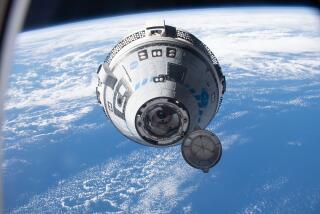Rocket Tests Seen Delaying Shuttle Flights Until 1988
- Share via
HOUSTON — The space shuttles probably will not be ready to fly again until early 1988 because of the testing required to qualify a new solid-fuel booster rocket design, an authoritative NASA source said Friday.
The source, who spoke on condition that he not be identified, said requalification of the booster system may require three full-scale tests “that will extend the program out some number of months.”
The presidential commission led by former Secretary of State William P. Rogers that investigated the Jan. 28 explosion of the shuttle Challenger blamed the explosion on a failed joint between segments of one of the two booster rockets and ordered that the rockets be analyzed and redesigned.
The source said that engineers from the Marshall Space Flight Center in Huntsville, Ala., and from Morton Thiokol Inc., the Utah manufacturer of the rockets, have settled on two primary new designs.
John Taylor, a spokesman at Marshall, said he could not confirm that engineers had selected primary candidate designs for correcting problems with the booster. He said that John Thomas, head of the NASA redesign team, would hold a news conference Wednesday to give a status report on the redesign work.
James C. Fletcher, administrator of the National Aeronautics and Space Administration, announced earlier this year that the agency was aiming at a July, 1987, target date for the first launching of a shuttle since the Challenger explosion.
But the NASA source said a redesign engineering team has determined that the work will take longer than first expected.
“The July, 1987, launch date is just not do-able,” he said. “We could have delivery of the new boosters in the fall of 1987, which would probably put the launch into early 1988.”
More to Read
Sign up for Essential California
The most important California stories and recommendations in your inbox every morning.
You may occasionally receive promotional content from the Los Angeles Times.













